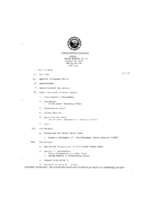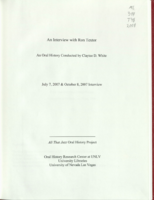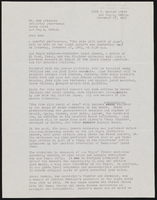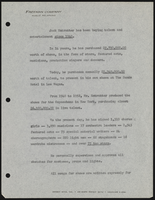Search the Special Collections and Archives Portal
Search Results
Johnny Pate and Jillean Williams oral history interview
Identifier
Abstract
Oral history interview with Johnny Pate and Jillean Williams conducted by Claytee D. White on March 04, 2004 for the Boyer Early Las Vegas Oral History Project. Johnny Pate discusses his best friend, Joe Williams, and talks about his career as a renowned jazz musician. Jillean Williams then talks about Joe Williams, her late husband, and about living in Las Vegas, Nevada.
Archival Collection

Transcript of interview with Judy Jetter by Lisa Gioia-Acres, September 10, 2008
Date
Archival Collection
Description
Judy Jetter, a devout jazz music enthusiast, was born in a Chicago suburb in 1939. At the age of three, Judy began taking acting as well as tap and ballet classes. While raised by her mother until age 15 Judy was forced to study opera even though jazz music was her passion. Her first introduction to jazz came while listening to, legendary jazz great, Woody Herman on the radio. Judy developed an instant appreciation and love for jazz music. While working as a commercial actress during her childhood - Super Circus and Peter Pan peanut butter - Judy experienced live performances by the Stan Kenton Orchestra and was completely amazed. After graduation Judy was married and gave birth to her son. She worked for a movie studio in Chicago doing various jobs such as cleaning the stage, typing scripts, model work, and even playing the role of housewife. Later Judy went to college and earned a degree in psychology, which led to a job as a therapist. However, after remarrying to Bill Jetter, Judy switched careers and soon became an exercise instructor at the YMCA. There she cultivated her passion for working with people who suffered from disabilities. In particular, Judy developed a water regiment specifically designed for people with disabilities. Judy would go on to share her experiences in this field in two subsequent book publications. Unfortunately Judy's husband passed away with cancer. However, Judy found refuge and support from a group of jazz enthusiasts. Alongside her cadre, Judy began really studying how to listen to music. She moved to Las Vegas in 1992 and can often be found at different jazz venues throughout the city. She enjoys the local jazz scene in Las Vegas and making her weekly rounds to take-in Big Band and jazz singers such as Jobell and Terri James, as well as going to see Bruce Harper playing at Bugsy's, and the talented Gus Mancuso performing at the Bootlegger. Judy believes that music, like everything else, has evolved and will continue to mature; however, jazz musicians such as Louis Armstrong still remain as the foremost contributors in the long history of jazz music. Her hope is that music and the arts will continue to be offered through education to allow the next generation another "dimension to not only their education but their soul."
Text

Meeting minutes for Consolidated Student Senate University of Nevada, Las Vegas, October 18, 1984
Date
Archival Collection
Description
Text
Calvin Shields oral history interview
Identifier
Abstract
Oral history interview with Calvin Shields conducted by Claytee D. White on May 07, 2009 for the Boyer Early Las Vegas Oral History Project. Shields begins by discussing his upbringing in Florida and his early interest in playing the trumpet before being drafted into the United States Army during World War II, where he learned how to play the drums in a military orchestra. Shields describes his career as a musician following his military service, playing as a drummer for singers such as Sammy Davis Jr. and Billy Williams and in various club and casino orchestras in Las Vegas, Nevada. Shields provides his experiences of segregation in Las Vegas as an African American man, and discusses how African American culture has changed and progressed.
Archival Collection
Henry L. Regan Jr. oral history interview
Identifier
Abstract
Oral history interview with Henry L. Regan Jr. conducted by John Grygo on October 12, 2012 for the African Americans in Las Vegas: a Collaborative Oral History Project. Regan discusses arriving in Las Vegas, Nevada in 1958 and becoming a musician and a gang member. Later, he discusses turning his life around and becoming a skycap at McCarran International Airport.
Archival Collection
Jon Vogel oral history interview
Identifier
Abstract
Oral history interview with Jon Vogel conducted by Carol A. Fitzgerald on March 29, 1976 for the Ralph Roske Oral History Project on Early Las Vegas. In this interview, Vogel discusses his personal history in Las Vegas, Nevada. Vogel describes moving to Las Vegas as a child in 1943 and growing up in the city. He talks about his cement and landscaping business and the projects he has worked on for the city of Las Vegas. Vogel's wife, Tootie Vogel, later joins the interview, and together they discuss musicians and entertainment in Las Vegas. Lastly, they describe how Las Vegas has changed since the 1940s.
Archival Collection

Transcript of interview with Ron Textor by Claytee White, July 24, 2007 & October 8, 2007
Date
Archival Collection
Description
Ron Textor grew up in Kirksvile, MO shortly after moved to Flint. MI; father was a doctor and mother a school teacher; started piano lessons at 5 and trombone at 8; attended classes at the Stan Kenton clinics at Michigan State University; National Stage Band Camp at Cleveland at the Western Reserve University; started own band at age 14 in Flint, MI; graduated high school in 1965; went to Central Michigan University graduated in 1969 with a bachelor's in music; 1972 released from the army and joined the Glenn Miller Orchestra under Buddy DeFranco; trumpet player Tom Snelson — Phantom of the Opera; The Airmen of Note; Colorado Springs Symphony Orchestra; recording at RCA Victor in Tokyo; 50 weeks a year of one-nighters; St Regis Roof in New York City; book by George Simon on Glenn Miller; Medina Ballroom; traveling by bus; rehearsal with Frank Sinatra; master's degree from Central Michigan; taught college at Michigan, Central, and Alma College; Mott Community College; moved to Wisconsin and taught at Mount Scenario College in the late 70 s; General Motors; Genesee County Fine Arts Council; CETA; Detroit Montreux Jazz Festival; 1981 Montreux Switzerland Jazz Festival; North Sea Jazz Festival at the Hague in Holland; move to Las Vegas 1981.
Text


